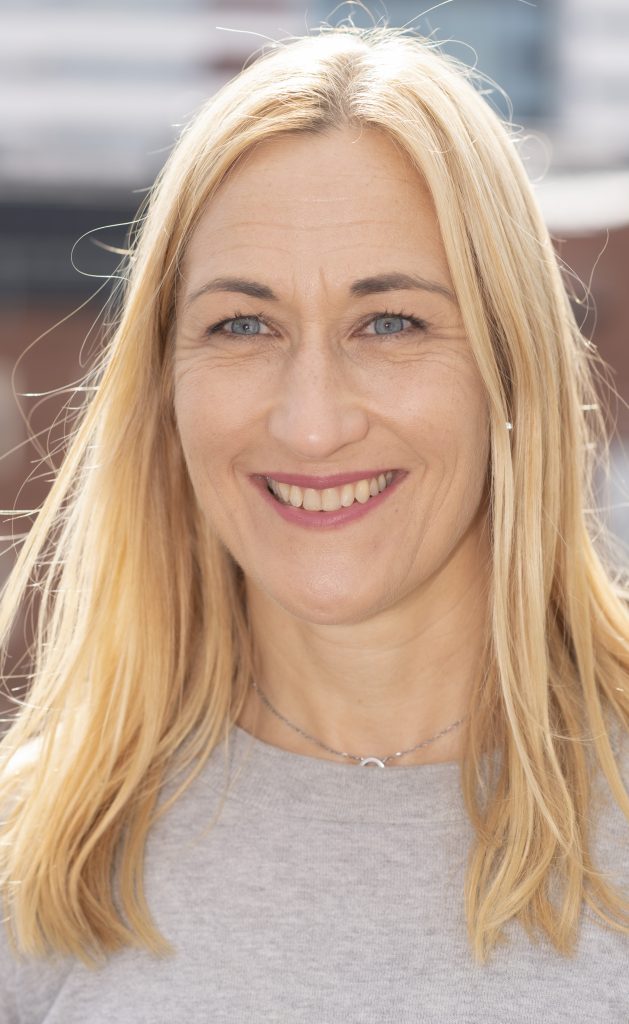
Academic research – a privilege one should not take for granted
Camilla Svensson is an associate professor at Karolinska Institutet (KI), doing research on cellular and molecular pain mechanisms in rheumatic diseases at the Department of Physiology and Pharmacology. She is a pharmacist by profession and received her PhD in 2005 from the University of California/San Diego (UCSD) for her work on spinal mechanisms of pain transmission. She decided to continue as a postdoc at the Division of Rheumatology (UCSD) where she got the possibility to lay the foundation for her later career in academia and her return to KI in 2008.
Written by Janika Welzel, PhD student at Karolinska Institutet and participant of the course “Career Skills for Scientists” during the spring term 2024

I first met Camilla Svensson through a meeting series we both participate in focusing on autoantibodies and their role(s) in rheumatoid arthritis. I was fascinated immediately by her dedication and positive attitude towards academic research, but also her very open and approachable demeanour especially towards young researchers. After starting to work in closer collaboration with her and her group, I became curious to know more about her career path and asked her for an interview which was part of the course “Career Skills for Scientists” offered by KI.
The interview took place over zoom, and to find a nice introduction I asked Camilla to describe a typical work week, including all the tasks, activities, and responsibilities.
“I love my job! No week looks the same and it is very versatile! Most of my time is centered around my group members, where I have individual and group meetings discussing their projects and issues and plan the next steps. I would say I spend close to one full day a week on that but spread over several days. In addition, I have other meetings, as I am a member of the management group of the department and am also part of the Committee for research at KI. So around two thirds of my workweek is taken up by meetings. Then, dependent on the week, I also have teaching duties, where I prepare for and perform teaching, write exam questions, and mark exams.”
I was further interested in the teaching part of her job, and asked if she can go into more detail here.
“I am responsible for the course in pain physiology and immune pharmacology. This means that I teach this course to different students with different backgrounds. At the moment, I teach medical and dental students, biomedicine, and pharmacy students in their bachelors, and even logopedic students. This is great because I get all sorts of questions and they often inspire me to look at things from a different angle!”
The remaining third of her time she spends on reading, writing, and reviewing papers, and writing grant applications. Overall, she stressed that it is a very dynamic job with various tasks!
Falling in love with science
One of the central questions for me throughout this interview was regarding her main motivation and driver to pursue a career in academia, and if she had always felt a vocation to do academic research. Her answer was very inspiring and valuable to me, as you hear mostly about the negative parts of the academic career path. She said that quite early on during her undergraduate studies she got interested in research and wanted to experience that abroad. She continued her pharmacy program at UCSD in San Diego, California, and one could really feel the excitement and enthusiasm when she was talking about her time there.
“After one month there I had completely fallen in love with science! I think it was a combination of an amazing research environment and super happy and energetic people!”
She speculates that this also has to do with the sunny weather, and that people spend most of their recreational time doing outdoor activities. The combination of that fitted her very well, and the very extrovert environment helped her to really grow in her confidence.
“That was really the time when the foundation for me was laid to love academia. I worked very hard and had an amazing supervisor and mentor also throughout my PhD that gave me many opportunities early on. He would give me his spot when invited to conferences which gave me a lot of exposure, and I could meet a lot of different people and start to build my own profile.”
Navigating along the career path
We continued talking about the academic career ladder, and she revealed that she got two job offers at Harvard Medical School throughout her journey, which she both declined due to personal reasons. I thought this was very impressive, and asked what her thoughts are on how she managed to stand out from the other candidates. She confirmed that the competition was brutal, but that she found her own niche of research, and always tried to be strategic about her next steps.
“It was not about publishing in high impact journals for me, although that is certainly also a strategy, but more about the why I do the things I do, how can I contribute to the field and what are the gaps in knowledge. I always enjoyed bridging different research fields when I saw there was a lack of interaction or communication and was always driven by the desire to cover new grounds. I applied for small grants during my PhD and as a postdoc and took the extra hours to follow up on my own ideas and interests. I think this was really the main factor why they considered me a good candidate.”
At the end though her decision to move back to Sweden was out of personal reasons and a better overall offer as associate professor at KI.
Networking, mentorship and constant learning
After all these inspiring and motivating words, I was naturally interested in hearing her advice and recommendations on a successful career in academia. Her instant response to that was networking and good mentorship. She also pointed out the supporting aspect of a good network, where everyone helps and learns from each other. I liked this answer a lot since most people tend to rather focus on the competitive aspects of research. One thing she wished she had put more focus on earlier is the teaching aspect. During her time in the US, she basically did no teaching and had to learn that from scratch when coming to KI, which she admits was quite challenging for her in the beginning.
“But as with most things in life, you can still learn them later on.”
As a concluding question, I asked her if she thinks a career in academia nowadays is still feasible and viable. She hesitated for a moment and said that this is a very difficult question to answer.
“The signal I get nowadays from young researchers is that it is too hard and that it feels like too much effort. This often makes me a bit sad as I have seen a lot of talented people leave academia, also from my group, where I thought they would definitely stand a chance. That can be heartbreaking at times. But I can only speculate that maybe there are higher demands nowadays, and maybe there is much more information out there that can feel quite overwhelming to people.”
A hobby and a privilege
What she certainly would say to someone who wants to pursue a career in academia though is to think of your job also as your hobby, as it will take a big toll on your hours.
“When I have moments of doubts because I spend a lot of my free time on my job, I come to the conclusion that I love doing it and that it is after all worth it!”
Her final comment really moved me and I hope I can incorporate this feeling in my own research journey.
“The way I was trained and how I grew up in science was that this is a privilege! Very few people actually get to do what I am allowed to do, to be in control over your time, and that I can affect how I want to design my work and what I want to focus on. Up until today I see this as an enormous privilege and am extremely grateful for it.”

0 comments